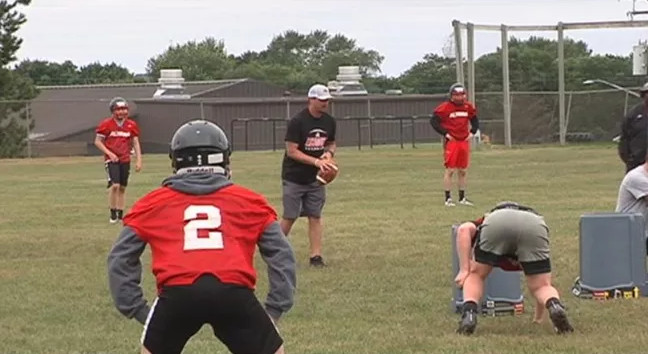Elizabethtown boys’ basketball coach James Haire has been around high school athletics for nearly four decades, so it doesn’t come as a surprise to him that teenagers smoke marijuana.
It’s something he’s battled for the better part of the last two decades, making sure his players make the right choices. Haire isn’t alone.
North Hardin boys’ basketball coach Michael Cofer and John Hardin boys’ basketball coach Jared McCurry fight the same battle.
Last season, all three schools had an occurrence with a player and marijuana, according to the coaches.
“I hear about it all the time,” Haire said. “It used to be more hidden, but now they openly talk about it.”
McCurry said when he played basketball at Elizabethtown in the late 1990s, it wasn’t marijuana that high schoolers talked about.
“Since I’ve been here at John Hardin we’ve had two instances,” McCurry said. “I think somebody said this to me and it’s true. When we grew up you always heard people talking about beer. Now they’ve turned to marijuana. It’s a sad thing and it’s a growing problem.”
Cofer has had two instances with players and marijuana. It’s something he feels strongly about but he said the schools are doing their best to police it with random drug testing.
“It’s been around for a long time,” Cofer said. “I think kids get older and they start making their own decisions. They make mistakes. It happens. It’s the state of nation right now. It’s a part of the culture and it’s in society.”
Coaches not only have that title, but often they have to play counselor. They sit down with their players multiple times throughout the year to talk to them about drugs and other things and making the right choices.
“Every day at the end of practice we go to the locker room,” McCurry said. “We don’t stay on the floor. We go to the locker room and we talk to them. Not just about drugs, but treating their teachers and parents with respect. As coaches we want to win, but the real enjoyment is watching these kids go on and be successful.”
It starts with talking with the players and the dangers of drugs. McCurry said the coaching staff often uses examples of athletes who have had their careers derailed because of drugs.
“It’s all the time,” Haire said. “I have a zero tolerance policy and they know that. That’s why when they fail a drug test there’s a certain protocol they have to go through. The players are aware of that. You worry on holiday weekends and things like that. You try to make sure they are above the influence.”
McCurry said all they can do is talk to the players, but at the end of the day, they have to make the smart decision.
“We harp and harp on it, but we’re only around them so much,” McCurry said. “We are around them from 8 in the morning until the end of practice. From 7 (p.m.) on, you hope they make the right choices throughout the year.”
Cofer knows all too well how a season can go by the wayside when student-athletes don’t say no. Two years ago, the Trojans were one of the region favorites and then before the 17th District Tournament he lost several players. They made it to the 5th Region Tournament and then lost in the first round.
“I don’t know if I’ll ever able to let that go,” Cofer said. “We had the capability to go far. We could have done something special. I blame myself. What could I have done better to make sure that didn’t happen. It’s not about the wins and losses, but about the kids. You hope to guide them in the right direction.”
Cofer said he has talked more openly about the use of marijuana with his players, hoping to avoid a similar situation.
“We talk about it every day now,” Cofer said. “It’s something that happened two years ago and you hope doesn’t happen again. I never had a problem with those kids. Maybe I turned a blind eye. Maybe there’s something more I could have done.”
Haire said it’s a difficult task for coaches to keep players away from drugs.
“I’m not sure there’s more us, but it seems more accessible,” Haire said. “I don’t know how they get it so easy. But I hear about it all the time.”
Coaches want the best for their players. One occurrence is one to many in their eyes because the coaches understand the student-athletes are jeopardizing their future.
“As coaches, we all want the same things for our players,” McCurry said. “We want them to go on and be successful in life. That’s why we try to teach them life lessons. That’s big for us. If they slip up, as a coach you feel bad. You feel like you’ve failed them.”
Credit: news.vice.com

